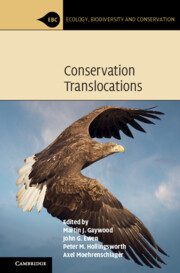Book contents
- Frontmatter
- Dedication
- Contents
- Contributors
- Foreword
- Preface
- Acknowledgements
- Part I Conservation Translocations: Getting Started
- Part II Conservation Translocations: The Key Issues
- 3 Conservation Translocations and the Law
- 4 Decision-Making in Animal Conservation Translocations: Biological Considerations and Beyond
- 5 Animal Disease and Conservation Translocations
- 6 Animal Welfare, Animal Rights, and Conservation Translocations: Moving Forward in the Face of Ethical Dilemmas
- 7 Conservation Translocations for Plants
- 8 Plant Health, Biosecurity, and Conservation Translocations
- 9 Genomics and Conservation Translocations
- 10 The Human Dimensions and the Public Engagement Spectrum of Conservation Translocation
- 11 Assisted Colonisation and Ecological Replacement
- 12 The Role of Conservation Translocations in Rewilding and De-extinction
- Part III Conservation Translocations: Looking to the Future
- Part IV Case Studies
- Index
- Plates
3 - Conservation Translocations and the Law
from Part II - Conservation Translocations: The Key Issues
Published online by Cambridge University Press: 07 December 2022
- Frontmatter
- Dedication
- Contents
- Contributors
- Foreword
- Preface
- Acknowledgements
- Part I Conservation Translocations: Getting Started
- Part II Conservation Translocations: The Key Issues
- 3 Conservation Translocations and the Law
- 4 Decision-Making in Animal Conservation Translocations: Biological Considerations and Beyond
- 5 Animal Disease and Conservation Translocations
- 6 Animal Welfare, Animal Rights, and Conservation Translocations: Moving Forward in the Face of Ethical Dilemmas
- 7 Conservation Translocations for Plants
- 8 Plant Health, Biosecurity, and Conservation Translocations
- 9 Genomics and Conservation Translocations
- 10 The Human Dimensions and the Public Engagement Spectrum of Conservation Translocation
- 11 Assisted Colonisation and Ecological Replacement
- 12 The Role of Conservation Translocations in Rewilding and De-extinction
- Part III Conservation Translocations: Looking to the Future
- Part IV Case Studies
- Index
- Plates
Summary
Law can influence conservation translocations in two basic ways: it can play a supportive and/or a restrictive role. Regarding the first role, legislation can provide support, a mandate, and/or an obligation to consider or perform a translocation. This may involve both general obligations to conserve or restore certain species or ecosystems, as well as specific obligations concerning species reintroductions or other types of translocation. Regarding the second role, legislation can impose limitations on translocation possibilities and/or make translocations conditional on meeting certain requirements. Such limitations and conditions may follow from legislation on native species protection, area protection, invasive non-native species, disease, trade, animal welfare, and several other areas of law. Requirements of both types may flow from international and national law. The legal requirements that will apply to any projected conservation translocation will depend on the countries, areas, and species involved, and there may be significant differences between one project and the next. The applicable requirements may be easy to meet for some projects, and be prohibitive for others. It is crucial that a careful analysis of applicable domestic legislation is carried out in the early stages of any contemplated conservation translocation. Practitioners should also make themselves aware of the relevant international legislation to provide them with the wider legal context of their work, and to help them influence the development of future legislation.
Keywords
- Type
- Chapter
- Information
- Conservation Translocations , pp. 77 - 107Publisher: Cambridge University PressPrint publication year: 2022



